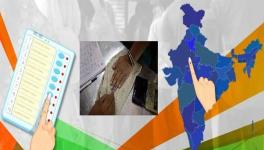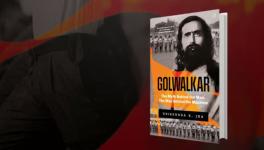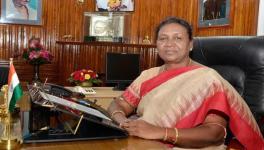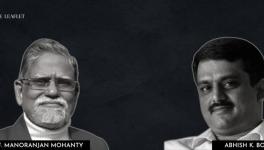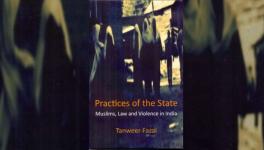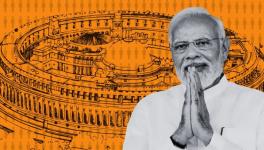Do Muslims Agree With Bhagwat’s View of Powerless Existence?
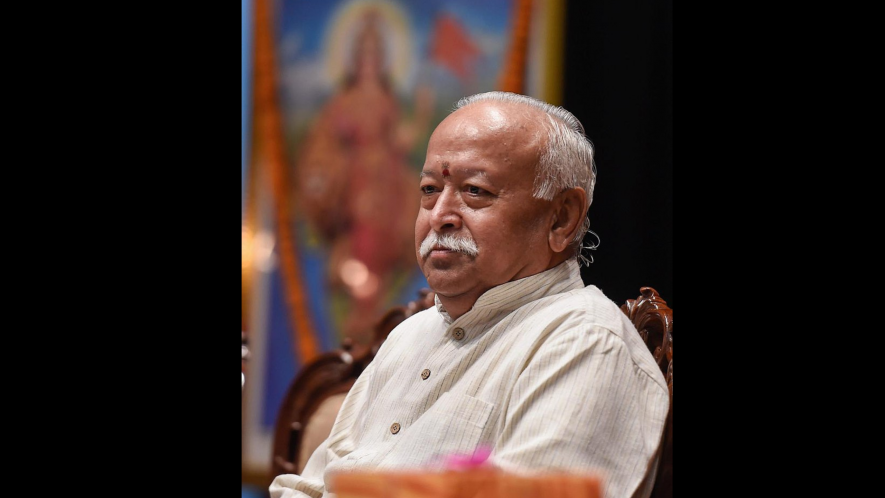
Mohan Bhagwat. Image Courtesy: Wikipedia
Of the five Ws—who, what, where, when and why—considered the essence of journalism, ‘who’ is not required to be examined, barring cursorily perhaps, when assessing the recent Mohan Bhagwat interview. But the other four are necessary, and in this order: where, what, why and when.
So, taking up ‘who’ first, Bhagwat is the chief, or sarsanghchalak, of the Rashtriya Swayamsevak Sangh (RSS) and formally presides over the largest ideological political conglomerate of the country. Consequently, his utterances need to be noticed and assessed because they have both short-term and long-term impacts.
Where: Bhagwat granted the interview to the editors of Sangh-affiliated publications Organiser and Panchajanya. Therefore, it was not much of a media initiative but essentially a well-thought publicity exercise with zero risk.
The danger of exposing the RSS chief to media scrutiny was non-existent because the two editors are part of the ideological fraternity and would not risk their future within the saffron brotherhood by asking awkward questions or framing a few supplementary interjections.
On the contrary, the questions were little but linguistic constructs that conveyed the sense of an in-depth query but effectively little and yet an opportunity to message the faithful while simultaneously befuddling those outside the fold who would read little but the ‘juicy’ bits selectively picked up by the mainstream media.
Yet it served a purpose—by demonstrating that the Sangh Parivar is no longer a shadowy organisation or political enterprise. With this interaction, Bhagwat ‘normalised’ media interactions of various Parivar functionaries by stating that “though we do not want to go to media on many issues, we cannot avoid doing so any longer”. He, however, added a rider: “... But we must not crave for publicity.”
Bhagwat’s ‘replies’ could well have been compiled and presented as a statement, article or essay but would not have had the same impact, and thereby, lies the importance of ‘where’—it is both an interview and not one too!
What: Most of what Bhagwat said has been stated in the past by various people, the most important ideologues of the Hindutva campaign, especially VD Savarkar and MS Golwalkar. Of the two, the former was never part of the RSS. In fact, he derided the organisation after he was permitted to travel and resume normal activity, including active politics.
But in the past few decades, the RSS-BJP-Parivar triumvirate has made conscious efforts to co-opt Savarkar formally into its own pantheon. Much of what Bhagwat said was Savarkar’s thoughts although articulated in a different manner.
Bhagwat commented on the following issues, although not sequentially and, in fact, returning to the same themes at different points of the ‘interview’: Sangh and its view of politics; history and foreign invaders; Hindu society; Hindu Rashtra (and identity); Shivaji and (Giuseppe) Garibaldi; the LGBTQ community; women and Sangh; economy; population imbalance (sic); Hindus and aggression; Partition—why it happened; Muslims—what they MUST do to remain secure; and Hindus (place and importance of) in India.
The RSS is a “cultural organisation”—so we have been told ad nauseam. Bhagwat removed the ambiguity: although the “Sangh has consciously kept itself away from day-to-day politics,” there are “other dimensions of politics that affect our national policies, national interest and Hindu interest. The Sangh has always been concerned about whether the overall political direction is conducive to these issues or not...”.
The RSS is thus NOT a cultural organisation but is SELECTIVE about its political interests. If someone disputes this as being ‘motivated’, it is wise to read this Bhagwat reiteration: “We are not concerned with day-to-day politics but we are definitely linked to rashtra neeti—the national policy.”
Now, let us move to history and foreign invaders. Bhagwat is unambiguous in his claim that “Hindu society has been at war for more than 1,000 years—this fight has been going on against foreign aggressions, foreign influences and foreign conspiracies”. It is implicitly suggested that due to the Sangh Parivar’s campaign over decades, “Hindu society has awakened” and that “it is but natural for those at war to be aggressive”.
If any doubts remained about the identity of the enemy, Bhagwat was explicit: “This war is not against an enemy without but against an enemy within. So, there is a war to defend Hindu society, Hindu Dharma and Hindu culture.” Is there any need to say that this war is against Islam and those who follow the faith?
There is no necessity to be as verbose as Bhagwat and because he tends to make the same point in different ways, and one can move to another of his pet themes: population ‘imbalance’: “Wherever (population) imbalance has taken place, our country has got divided. This has been the global trend and this happened because of the aggressive nature of people and civilisations.”
Although he justified “aggression” earlier and said that this was understandable (among Hindus) in the context of population ‘imbalance’, Bhagwat found it objectionable enough to flag it as a major argument.
The sarsanghchalak also postulated that these ‘problems’ are “not only about the question of birth rate. Conversions and illegal immigration are the main reasons for the imbalance. Preventing this restores balance. We have seen this too. Therefore, the population policy should ensure this balance.” Let no one say hereafter that the RSS is not given to making policy prompts.
Moving to three other pet themes of the RSS in communal polarisation: Hindu Rashtra (and identity); Partition—why it happened and Hindus (place and importance of) in India. Let’s take up the issue of Partition.
On this, Bhagwat is clear that “from the earliest point in recorded history, Bharat has been akhand and undivided”, and then he auto prompts the answer among (faithful) readers by posing a rhetorical question: “Islam’s devastating invasion ended after centuries. How come the country got suddenly divided later?”
The RSS chief has a one-liner ready for a question that does not have a linear answer: “I see only one reason: Hindu bhaav ko jab-jab bhoole, aayee vipad mahaan, bhai toote ... dharti khoyee ... mite dharm sansthan (Whenever we have forgotten the core Hindu sense, we have faced great calamity, brothers got separated, the land was lost and religious institutions were erased).
Bhagwat reveals civilisational arrogance, which drives the Sangh Parivar: “Hindu bhaav does not create any obstacle in the Islamic way of worship. Hindu is our identity, our nationality, our civilisational trait—a trait that considers everyone as ours; that takes everyone along.”
Possibly, the bluntest exposition of what is to be done for social tranquillity at this stage is regarding his view on what Muslims MUST do to remain secure. Bhagwat actually begins by condescendingly saying that “there is no harm to the Muslims living today in Bharat. If they wish to stick to their faith, they can. If they want to return to the faith of their ancestors, they may. It is entirely their choice”.
However, “Muslims must abandon their boisterous rhetoric of supremacy. We are of an exalted race; we once ruled over this land and shall rule it again; only our path is right, rest everyone is wrong; we are different, therefore, we will continue to be so; we cannot live together—they must abandon this narrative”.
Muslims can clearly just hope to ‘live’ and not imagine being part of the power structure.
It would be worthwhile to pose a question that was never put at the non-interview: How many Muslims in contemporary India think this way, and what is the evidence for this assumption?
Moving on to ‘why’, the examination is mainly necessary for the only new element in Bhagwat’s exposition: his viewpoint of LGBTQ. The RSS leader began by putting the blame for the issue, surfacing in recent years, on the doors of the Sangh Parivar’s detractors: “the so-called neo-left”.
However, after having denied the existence of the community and terming it as being “not in sync with nature” and saying that “traditionally too, Indian society does not accept such relations,” he asserted: “These are not new issues; they have always been there. These people also have the inalienable right to live. .... We have a transgender community. We did not see it as a problem. They have a sect and their own deities. They have their own Mahamandaleshwar too. During Kumbh, they are accorded a special place.”
Before taking up the ‘why’, one needs to ask if all in this community are Hindus to have their own sect, deities and Mahamandaleshwar?
Behind this sudden reversal is not just the need to be seen as modern by a population and become younger by the day. Instead, it is also a realisation, as families open up to the community and begin to stop ostracising their own, that the community is also a potential political group whose support would be welcome.
Finally, last, but not the least important ‘W’—when. 2023 is the year of crucial Assembly elections in, at least, nine states and also possibly the 10th (in Jammu and Kashmir). And next year is the Lok Sabha Election. Did not Bhagwat say that the RSS is concerned with national policies?
Another important scheduled event in the mid-term future is the RSS centenary in 2025, which shall almost coincide with the 75th anniversary celebration of India becoming a Republic in 1950.
Would it be better for the RSS to have ‘their own’ government in office during the centenary celebrations or would they rather fashion an adversarial one? Quite obviously, the former.
Make no mistake. The RSS does not now work at cross purposes with the BJP during any election. It might have lost out in the order of precedence in the protocol list in the past eight-and-a-half years to the prime minister, but the RSS has been co-opted and has gains to make by playing according to new Sangh Parivar rules. And, Bhagwat remains committed to protecting the RSS interests.
The writer is an NCR-based author and journalist. His latest book is ‘The Demolition and the Verdict: Ayodhya and the Project to Reconfigure India’. His other books include ‘The RSS: Icons of the Indian Right’ and ‘Narendra Modi: The Man, The Times. He tweets at @NilanjanUdwin. The views are personal.
Get the latest reports & analysis with people's perspective on Protests, movements & deep analytical videos, discussions of the current affairs in your Telegram app. Subscribe to NewsClick's Telegram channel & get Real-Time updates on stories, as they get published on our website.









